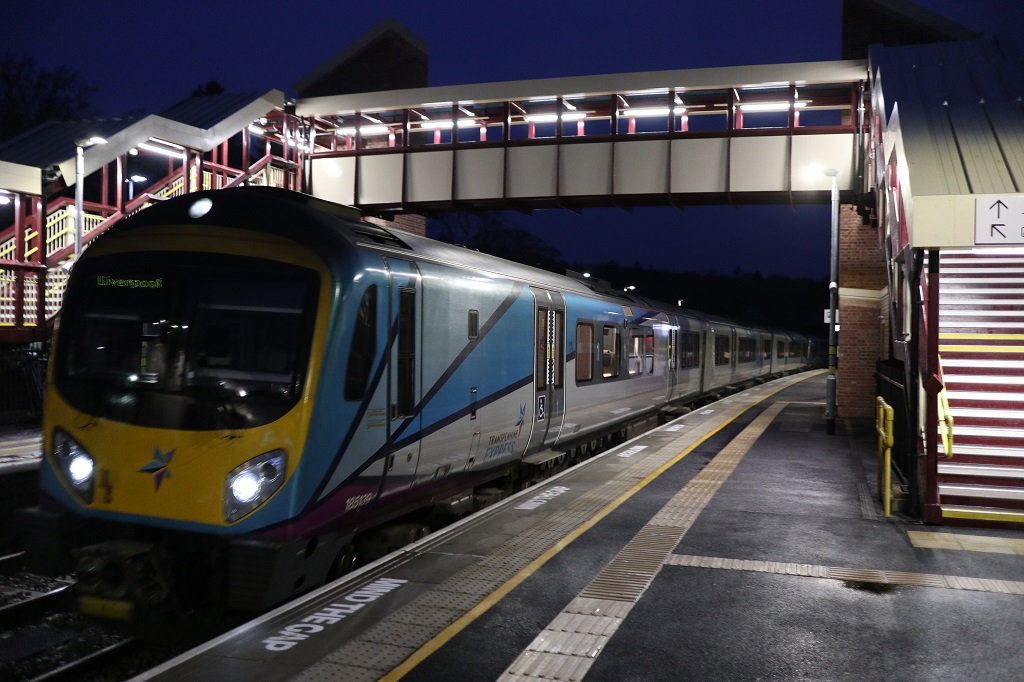The Subplot
The Subplot | Northern Powerhouse Rail, investment zones, funds squeeze
THIS WEEK
- Mind the gap: Northern Powerhouse Rail may – or may not – be about to get back on track
- Elevator pitch: your weekly rundown of who and what is going up, and who is heading the other way

BEWARE OF PASSING TRAINS
Northern Powerhouse Rail is back on (or not)
Is new Prime Minister Liz Truss proclaiming full steam ahead on Northern Powerhouse Rail? Or is it curtains for her premiership, and a quiet siding for the long-awaited high-speed train connection across the Pennines?
Earlier this week in an interview with ITV, freshly minted PM Truss seemed to firm up a vague commitment to the £39bn Northern Powerhouse Rail project. The position up until now was a commitment to put together a costed plan – a position some distance away from agreeing to give the go-ahead to a project shunted into the sidings by the Johnson government’s £96bn Integrated Rail Plan from last year.
Watch the interview
In the ITV interview Truss was offered the chance to say there would be a new electric line from Liverpool to Hull, and said “yes”, but when invited to make that crystal clear, she didn’t quite get the words out. Instead, the focus shifted to having a stop in Bradford (perhaps something to do with coming from Leeds, perhaps to do with marginal seats in that city?). She added that plans would come “in due course”, which doesn’t sound very urgent.
Embarrassing pauses
Given Truss’s recent record of interview mishaps, and her earlier very modest commitment to a costed plan for NPR (which already exists), it’s probably not what you’d call a bankable commitment. NPR supporters – including Transport for the North – were quick to claim it was a cast-iron commitment, but that might be fanciful. The most obvious trip hazard is money. Borrowing is not as cheap as it was, whether for governments or for anyone else, and £39bn is a lot of money. Meanwhile, government debt has ballooned and the way out of the mess might be public spending cuts, with room for manoeuvre strictly limited. Subplot doesn’t buy the ‘uprate benefits and kiss goodbye to NPR’ line, but there’s room for scepticism of the believe-it-when-you-see-it kind.
Silence
Subplot listened to the entirety of Truss’s Conservative conference speech yesterday and didn’t spot a reference to NPR, a pro-growth policy you might expect her to trumpet if she meant it. Draw your own conclusions.
We will survive
Would it matter if NPR doesn’t go ahead? Yes. Property people of all shapes and magnitudes will tell you NPR is a good thing, and it is. What they tend not to say in public, but do say in private, is that it’s good but not essential for Manchester, good and more useful for Liverpool, and potentially very good if you want to balance the UK economy away from London. But not having it won’t suddenly make Manchester’s Piccadilly East development area into a wasteland, and tumbleweed won’t roll down the M62 corridor of distribution and industrial sites. Missing out on NPR is missing out on a chance to do a good thing; its absence is an opportunity lost, not a death blow.
Not happy
Capital&Centric co-founder Tim Heatley, who is involved in projects in Liverpool and Piccadilly East, says: “If the new lines happen, the big winner in the North West has got to be Liverpool. It’s not on the HS2 line, so it needs a fit-for-purpose, fast, reliable rail service and NPR is a solution. That’ll do wonders for both investors and developers looking at where to commit.” As for Piccadilly East: “Places directly on the doorstep of the hub stations, like Manchester Piccadilly and the Piccadilly East neighbourhood we spearheaded will be obvious winners. But that only works if the full network gets delivered.”It’s not all bricks and mortar
What property people add, though, is that focussing everything on NPR slightly misses the point, because there are a lot of other opportunities that could be grabbed but are in danger of being missed. Training and education get mentioned a lot, health is increasingly prominent, simply getting buses to work is rated as urgent. Some stable long-term regeneration funding would be ideal. The senior people Subplot talks to are eye-rollingly frustrated that the government doesn’t seem to get this. Their message to ministers is, it’s not all about tower cranes, okay?
Widening gap
A blistering analysis from Oxford Economics suggests that Truss’s Growth Plan 2022 will fuel London and the South in the years to 2030 (with growth of 2% GDP), but will leave other regions lagging. The North West will grow by 1.75% or thereabouts, and that means the gap between the South East and the North West will widen, not shrink in the medium-term. The NPR plan is not bankable either, the consultancy said. “These are likely to be held back by financial constraints or political pressures, or both,” said Richard Holt, Oxford’s director of global cities research.
What to do?
For now, Transport for the North and its allies will try to hang on to as many of the wins from the Integrated Rail Plan as they can – no small task – while attempting to prise open the small crack in the NPR door Truss might have opened. But they were marched up this hill once before by Boris Johnson, who promised then ratted, and scepticism is their only rational response.
Truss’s premiership may or may not make it to Christmas. Indeed, she may or may not make it to the end of October. But unless something changes in the public finances or in the London / Treasury mindset, NPR is not going to make it either.
 ELEVATOR PITCH
ELEVATOR PITCH
Going up, or going down? This week’s movers
Reality meets investment zones, and reality wins. Going down! Meanwhile, overseas investment in Manchester is waiting for a lift going up.
 Foreign money
Foreign money
Property is a long-term, slow-moving, keep-the-faith kind of investment. Unfortunately, it attracts too many investors who see it as a get-rich-quick scheme, and when the economy goes into reverse, the tension between the two leads to some nasty jolts. Unwisely, too many people and businesses keep their rainy-day money in property, forgetting that extracting it while it is actually raining will probably be impossible. Open-ended property funds are particularly vulnerable. So no surprise that this week asset managers at three property funds – Schroders, Blackrock and Columbia Threadneedle, all big investors in North West real estate – decided to postpone, slow or restrict withdrawals.
Behind this lies a bigger shift, which last week’s scary pensions crisis has emphasised. If you don’t know when you’ll need extra collateral, but live in a wobbly uncertain world, then real estate – slow to build, slow to sell – is a potential hazard. Some pension fund weightings may shift to reduce exposure to real estate.
What this means is that some funds will be selling – not distressed sales, nobody wants that – but they could be net disposers of real estate, or inclined to bid less often. This poses one of the first big real-time tests of the new post-2016 globally focussed Manchester property market. Perhaps overseas money will step in to fill the gap?
 Investment zones
Investment zones
The latest official paperwork on what “investment zones” will mean has been published. The document suggests that reality is gently colliding with the high, almost silver-bullet-level, political expectations surrounding the investment zone proposals Subplot discussed last week.
The tone of the first few investment zone documents issued a fortnight ago suggested that the planning people in Whitehall had an early-doors success in explaining to ministers how you couldn’t actually sweep away the rules, except some EU ones about habitat protection and pollution, the touching of which would be electoral suicide. Now it seems the tax people have been at work, too. Instead of a big offer to everyone – all must have prizes – we’ve now got signs of a more targeted intervention.
“The government will set a high bar for establishing investment zones,” the document says, explaining it wants high-impact locations that “demonstrate value for money, minimise displacement and bring forward new development”. Bids that can deliver quickly go to the top of the queue, bids with less risk of displacing investment also go to the top, and if your zone is to resolve a local “economic shock” then you, too, get a pass. Interestingly, these criteria trump value for money. All bids need to show, credibly, the impact over 10 years on things like land values and GVA, which is asking a lot since GVA projections on this scale are pure voodoo, and land values next week are anybody’s guess, so you can take 2032 estimates with a tractor load of salt.
What this strongly suggests is that somebody in HM Treasury is thinking hard about limiting the tax loopholes and complexities that investment zones would create. Already fairly lame proposals look even less thrilling as a result.
Get in touch with David Thame: david.thame@placenorthwest.co.uk
The Subplot is brought to you in association with Oppidan Life.






To add to the “We will survive” section above, Manchester with NPR and an underground through-station co-housing HS2 will become an economic powerhouse not just nationally, but also on a global scale. It will become one of London’s main competitors, which unfortunately, the majority of Tory and other regional MPs do not want, as not only does it take away from the Capital but they have a sense of jealousy that it is not their City (Birmingham for instance). Further, Northern Powerhouse would create a sprawling economic region containing cities such as Liverpool, Manchester, Leeds, Bradford and Warrington – this area alone would become wealthy enough to detract away from the South East’s riches. Ultimately I want NPR to happen more than anything, however, I’m not getting my hopes up just yet. NPR would take away the ‘them and us’ rhetoric Tory’s live by – something they clearly don’t want to do.
By Verticality
I wouldn’t get high hopes over the northern power rail funding this carrot has been waved around since the George Osborne days
By Anonymous
If the Tories gave a full high-speed line to the Liverpool City Region , as Tim Heatley said, and tried to improve it`s economy, then they would have a better chance of winning one or two parliamentary seats in the area. There are so many younger people there with ideas and business acumen but find they have to look elsewhere to fulfil their ambitions, look at Castore.
By Anonymous
Just thoughtful that the main effect here will be to legitimise the next Labour government making it a priority.
By Rich X
@Rich, 100% agree that if Truss kick-starts the process of NPR, Labour has to commit to delivering it in full. Anything other will risk key Northern seats. This could be a clever strategy by the Tory party knowing full well that they’re likely to lose the next election and will in turn use it against Labour to win back Northern seats, or if at this point Truss and co. are scrambling saying they’ll deliver anything and everything. Interesting!
By Verticality
Labour committed the country to HS2 just as they were about to lose power. It was a combination of last roll of the dice, and if that didn’t work it would be a nice little trap for the tories they were about to lose to.
History repeating itself?
By Jeff
Can we just clarify one thing.
Liverpool IS on the HS2 line and will receive HS2 trains from day 1 of the service becoming operational. It’s potentially damaging to the city to suggest otherwise.
By HStewey